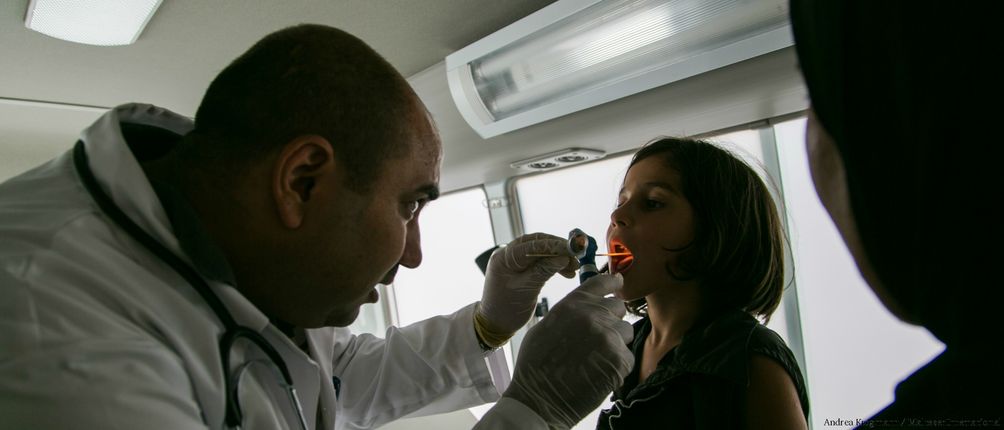
Mobile medical care for Syrian refugees and crisis affected Lebanese population
Since the outbreak of the Syrian war, Lebanon provided refuge to 17.5% of all Syrian refugees registered worldwide and has the highest refugee population per capita in the world. Today, there are an estimated 1.5 million Syrian refugees in the country of 6.8 million people. This is a huge burden for the health sector. Given the already fragile public health system and the current economic crisis in Lebanon, health centres and hospitals lack the financial resources to provide adequate care to refugees and vulnerable Lebanese. In addition, many of the refugees live in the poorest regions of Lebanon, which are characterised by a lack of infrastructure in all areas. According to an EU-funded multisectoral study, 83% of Lebanese households and 86% of Syrian households were in need of external support in 2021 because at least one household member did not have access to health care despite needing it.
For this reason, Malteser International, together with its local partner organisation, the Order of Malta Lebanon, operates four mobile medical units to ensure basic health care in the provinces of Akkar, Baalbek, Nabatieh and South Lebanon. Both Syrian refugees and Lebanese in need thus have access to free medical treatment and medication. If necessary, they are referred to a health centre, laboratory or hospital for secondary and tertiary health care.
Akkar
Northern Lebanon is one of the poorest regions in the country. In addition to existing structural problems, it has experienced a strong influx of Syrian refugees since the beginning of the Syrian war due to its proximity to the regions of Homs, Hama and Idlib. The high number of refugees compared to the number of inhabitants puts a considerable strain on the water and electricity supply, waste management and other basic services. The majority of Syrian refugees in the region live in difficult urban and semi-urban conditions; many refugees also live in informal tent settlements and collective shelters. According to a 2021 analysis by OCHA, Akkar also constitutes the governorate with the highest number of vulnerable Lebanese population, especially in the areas of health and nutrition.
Bekaa Plain
Due to its extensive border with the districts of Damascus and Homs in Syria, the Bekaa Plain has felt the effects of the Syrian war particularly strongly. Approximately half of the population is made up of Syrian refugees. Compared to Lebanon as a whole, the resident Syrians are particularly affected by poverty and most often live in informal tent settlements. Likewise, the Lebanese population is characterised by vulnerability. According to OCHA, the unemployment rate is one of the highest in the country and approximately 84% of households live below the poverty line.
Nabatieh
Nabatieh governorate is an underserved region in terms of social services due to the border with Israel and the resulting poor security situation, especially in the past. The existence of minefields results in unused agricultural land; cross-border security incidents occur regularly. Due to the short border with Syria, relatively few Syrian refugees live here compared to the rest of the country. Already in 2019, according to OCHA, twice as many Lebanese were among the vulnerable population in addition to Syrian refugees due to the economic crisis.
South Lebanon
The governorate of South Lebanon is also an underserved region due to the poor security situation caused by the border with Israel. The governorate has no border with Syria, which is why only about 10% of all Syrian refugees in Lebanon live in the governorate of South Lebanon. In this governorate, too, there is not only great hardship among the Syrian population, but also affects a large number of vulnerable Lebanese due to the economic crisis.
Our aim is to improve the health situation of Syrian refugees and vulnerable Lebanese living in the remote areas of Akkar, Baalbek, Nabatieh and South Lebanon provinces.
This will be achieved by improving access to primary health care, providing referrals to secondary, specialised health care services and through health promotion and disease prevention activities within the population. In addition, the existing synergies between the four mobile medical units and the eleven fixed health posts operated by our partner Order of Malta Lebanon throughout the country are further strengthened.
- Operation of four mobile medical units, each of which provides around 1,800 medical treatments per month
- Referral of patients to the health centre or hospital for further examinations and secondary treatment
- Home visits and, if needed, including physiotherapy treatments for patients with limited mobility
- Strengthening the preventive health capacities of the population through health and hygiene campaigns
- Strengthening of social cohesion in the population through awareness-raising and educational events
- Monitoring root causes of disease outbreaks and prevention of locally occurring health risks through the distribution of basic hygiene kits and targeted education campaigns
Country info
Capital: Beirut
Area: 10,452 km2
Population: ca. 6.8 Million
Project data
Project duration: January 2023 – March 2025
Donors: ADH - Germany's Relief Coalition, German Federal Foreign Office, private donations
Partner: Order of Malta Lebanon








